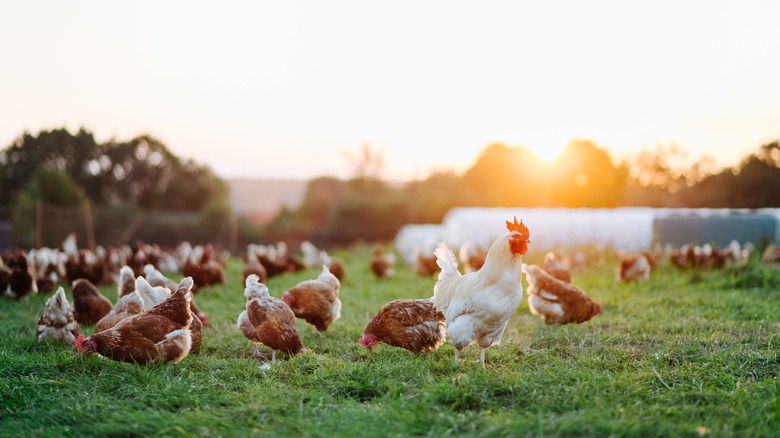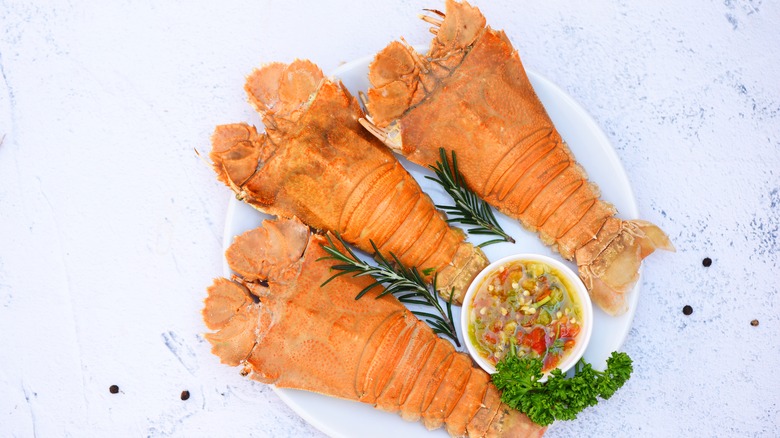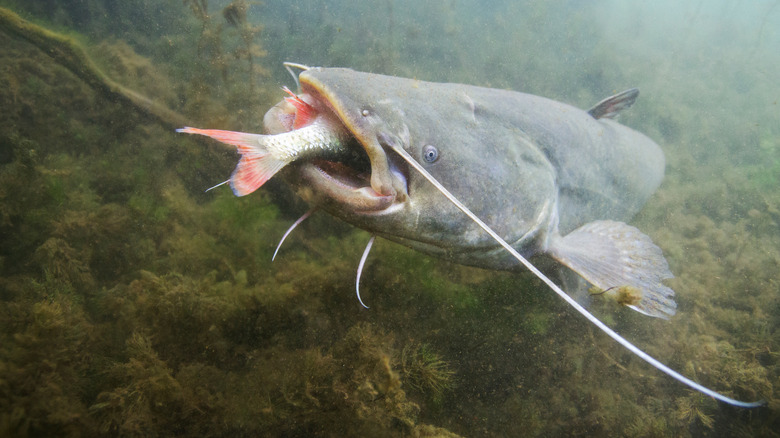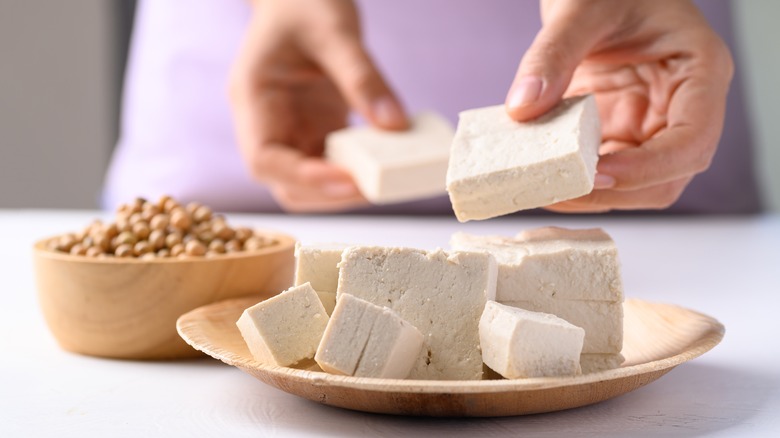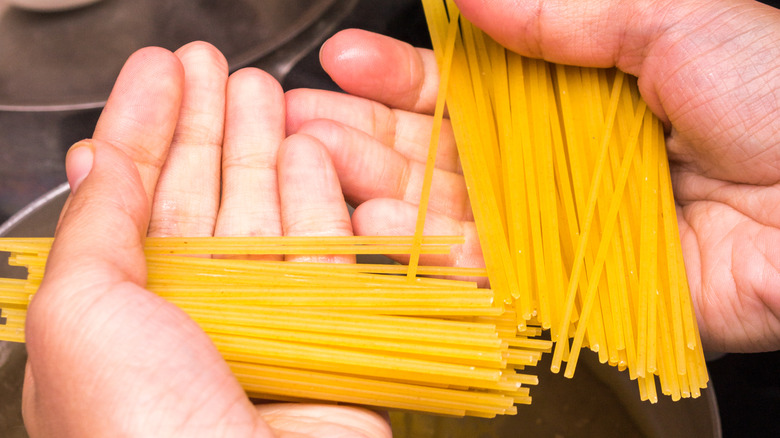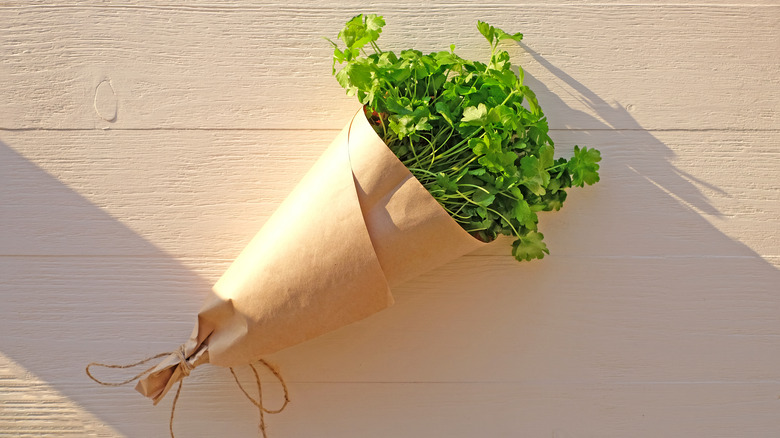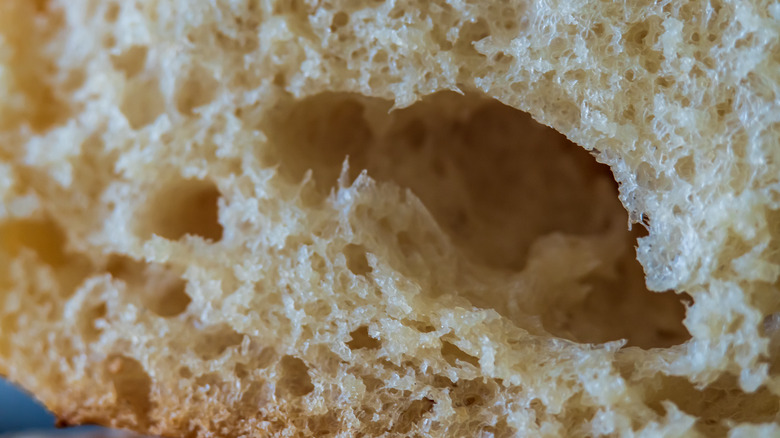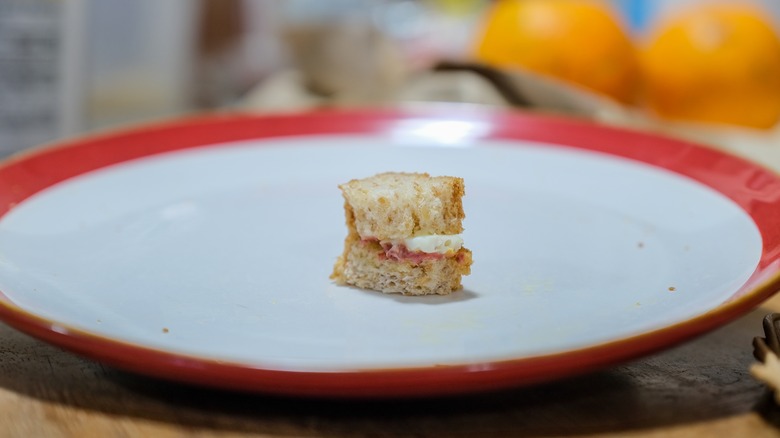8 Foods That Are Bad Luck To Eat On New Year's
The start of the new year marks a time for beginnings and renewal, and for many of us, it represents a time for a clean slate. We begin a new diet, join a new gym, pick up yoga for the first time, and promise we'll keep these resolutions going strong in order to achieve the longevity, health, and prosperity we are seeking in life. If you're hoping to start the new year off right, there are many good-luck foods to eat on New Year's Eve that are believed to bring about good tidings in the year to come.
That being said, there are also some foods you'll want to avoid if you're hoping to get off on the right foot. When you're ready to pop open the Champagne, be sure to check out this list of superstitious, bad-omen foods so you may avoid them at all costs, and therefore kick off the new year with the best luck and fortune possible.
1. Poultry and winged fowl
If you don't want your luck to fly away on New Year's Eve, then we suggest not eating chicken – or any type of winged fowl, for that matter. As explained by the Victoria Advocate, the superstition goes that winged fowl like chickens or turkey scratch around in the dirt looking for their food, so if you consume these at the start of the year, you'll likely be scratching in the dirt looking for food, money, and fortune for the next 12 months.
Eating anything with wings on New Year's Eve is also considered bad luck as it could symbolize your happiness flying away. If scratching dirt and flying away is not enough to make you steer clear of winged fowl one night out of the year, then perhaps the fact that chickens and turkeys are known to scratch the dirt while moving backward will help you move forward with your decision to abstain. From chickens to lobsters (see below), any food that moves backward is considered back luck on New Year's Eve.
2. Lobster and crab
While surf and turf is pretty much the classiest dinner combination there is, it's recommended you skip lobster on New Year's Eve because the crustaceans move backward and this is considered bad luck, notes Smithsonian Magazine. The superstition can be traced back to Austria and Eastern Europe, where it's believed that eating anything on New Year's Eve or Day that moves backward means you will experience setbacks in the year to come. Although lobsters do swim forwards, according to One Kind Planet, they can swim very quickly backward when they sense danger from a predator.
Other crustacean family members like shrimp and crabs are also considered bad luck as they move from side to side. The only way to truly enjoy surf and turf for your New Year's dinner celebration is to eat any seafood that swims in a forward motion, like salmon, which is considered especially lucky because it swims in schools, which promotes prosperity and progress in the year ahead.
3. Bottom feeders
The general rule of thumb is that anything that swims or moves forward serves as a lucky entrée on your New Year's dinner plate, particularly if the fish has shiny scales, according to Southern Kitchen. Even pickled herring is considered a lucky tradition in Germany and Sweden, and in China, they prefer the whole fish, eyeballs and all.
Whatever fish you decide to celebrate your palate with, you'll want to skip the bottom feeders, which include fish like cod, halibut, shrimp, sole, scallops, and bass. Catfish is another bottom feeder to avoid when ringing in the new year, as superstition implies if you feast on catfish, you'll be feeding off of scraps for the year to come. Bottom feeders tend to graze along the murky bottom of a lake or ocean, scavenging whatever scraps they can find. This image of a bottom-feeding dweller is less than desirable when you're aiming for a healthy, prosperous, and fulfilling new year.
4. White-colored foods
There are lots of colorful foods that are good luck on New Year's, like collard greens or tamales, which green and gold colors respectively symbolize wealth and prosperity. Oranges and tangerines are another lucky golden charm, and gifting, displaying, or eating them in China means your year ahead will be chock-full of luck, success, and money.
When piling the luckiest foods onto your New Year's plate, you'll want to avoid anything white, like tofu, white potatoes, egg whites, rice, and bread, unless the bread is served as a round cake. The superstition surrounding white foods stems from Chinese culture, where white represents death, mourning, and bad fortune, according to How Stuff Works. Chinese people also wear white to funerals, which is where the association with death comes from. If you want to have a lucky and lively new year, it's best to avoid white foods at all costs, with the exception of sauerkraut, which is popular among the Pennsylvania Dutch and considered lucky on New Year's Eve, especially when paired with pork.
5. Short noodles
Dating back to the 1700s, long soba noodles have been a traditional New Year's Eve delicacy in Japan, as they are believed to promote longevity, health, resilience, and luck at the start of a new year or new month. Noodles have long been a staple in Chinese and Japanese cuisine, and are consumed at breakfast, lunch, and dinner in dishes like chow mein, udon noodle soup, and ramen.
But beware of a long noodle that is cut short or broken in half, as short noodles are a symbol of bad luck in most Asian cultures. In fact, a short or broken noodle symbolizes a shortened lifespan. Another suspicion regarding long and short noodles is that you're not supposed to cut the noodle with your teeth, chopsticks, or whatever utensil you're eating your ramen or udon with. Slurping down the long noodles in their entirety is essential for longevity and luck, (via spot).
7. Parsley
It's considered bad luck to bring parsley as a gift to your New Year's Eve dinner host, or anyone else for that matter. Dating back to approximately 1600, a superstition arose regarding gifting parsley, particularly when the clock strikes 12 a.m., notes the Darlington & Stockton Times.
Legend has it that a Greek army on their way to battle encountered some donkeys covered in parsley and interpreted the animals as a sign of impending doom (via "25 Essential Herbs You Need to Know"). The army ultimately decided the potential misfortune wasn't worth it and retreated. After that encounter, parsley became associated with death in Greece and was used to decorate wreaths at funerals, as well as placed on top of gravesites to honor the dead, according to Garden Betty. Our Herb Garden also warns against sniffing basil on New Year's Eve, as some physicians in the 1500s believed that it invited scorpions into your brain (obviously modern medicine proves otherwise, but if you're already avoiding all of these superstitious foods, it can't hurt to remove basil, too). Perhaps the best thing you can do to solicit good luck in the new year is to steer clear of any herbs on New Year's Eve.
8. Hollow bread
While it may not be limited to New Year's, slicing into a fresh loaf of artisanal bread and finding a huge, gaping hole is considered to be a very bad omen. And that's not just because making a sandwich with hole-ridden bread is practically impossible. According to ABC News, air pockets in bread are thought to be a symbol of a coffin and a premonition of impending death — either yours or someone you know. Yikes. Hearing that alone is a reason to cut out carbs in the new year.
These cavernous holes are actually referred to as tunneling, per The Bread Guide, and can be caused by a multitude of reasons, such as not kneading the dough enough, being impatient with rising time, or using flour that's too dense. Ultimately, trapped CO2 from the yeast in the bread causes these bready pits of despair. If your bread isn't scored deep enough, the gas can't escape and you'll be left with holey bread.
Still, if you're even a wee bit superstitious, perhaps stay away from fresh loaves of bread around New Year's Eve. Or you can always just slice the bread horizontally like one big sandwich. If there are any big holes in the loaf, that'll fix the problem.
9. The last bites on your plate
According to the language blog Learn German, in the land of biergartens and schnitzel, it's customary to leave a portion of food on your plate on New Year's Eve. (Though the exact amount is not specified.) The plate of leftovers is meant to sit out past midnight and is supposed to bring food abundance in the new year. Quad Cities Daily also mentions that this tradition may not just be a way of securing a little good luck in the new year, but that finishing all of your food on New Year's Eve could actually bring about a spell of bad luck. So maybe just leave an hors d'oeuvre or two on your plate at the end of your festivities.
As for why we do or don't eat certain foods around New Year's, anthropology professor Nan Rothschild explained to The New York Times, that it all goes back to our desire to bring about the best outcomes for our lives. "To say that a food brings good luck is a way of controlling the environment and one's destiny," Dr. Rothschild said.

